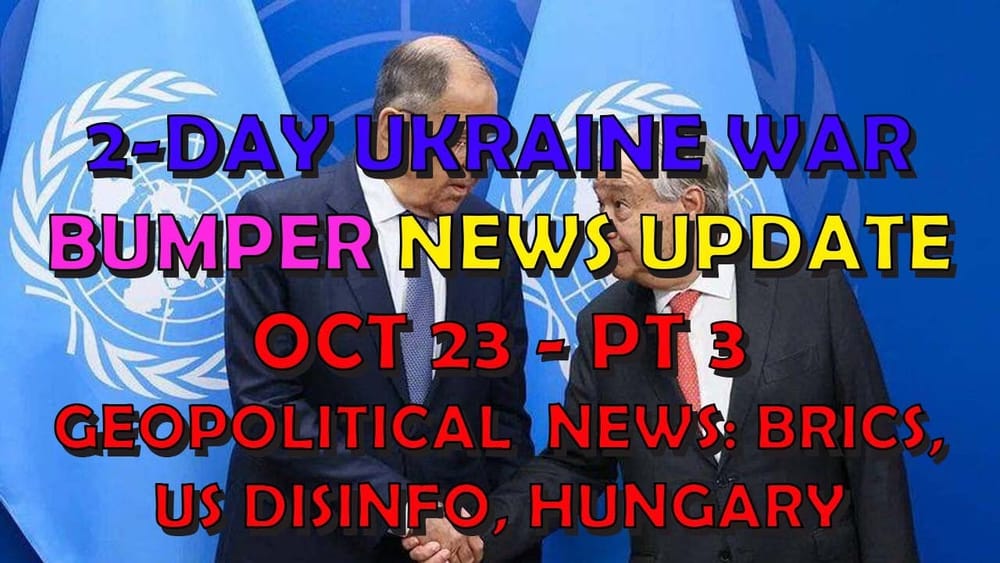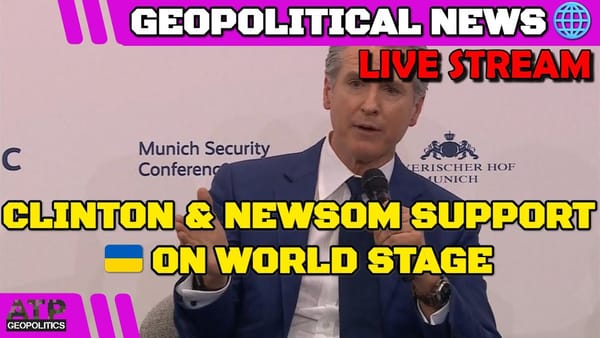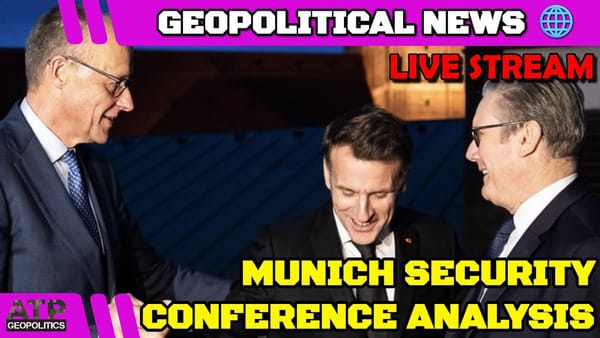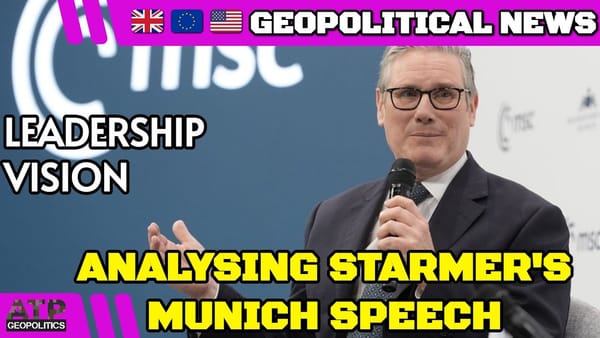Ukraine War Update BUMPER NEWS: Geopolitical News
Table of Contents 📖
Hello Team
🎦 00:00-00:23⏩
Jonathan welcomes viewers to another ATP Geopolitics video - a bumper update on global geopolitics and Ukraine. He warns that it's a long one. He likens the situation to a spiderweb of interacting components where seemingly small events can have a wider impact on global affairs.
Return to top⤴️
BRICS Summit Kicks Off in Kazan
🎦 00:48-02:36⏩
The 16th BRICS summit has commenced in Kazan, Russia, with 36 participating countries and six international organizations represented. Kremlin propaganda calls it the largest foreign policy event ever held in Russia. Participants include prominent leaders from India, China, South Africa, Egypt, Iran, UAE, Turkey, and Belarus.
- Visa and Mastercard issued outside Russia won't work due to sanctions. Participants are advised to bring cash. Even Russia's Mir payment system has faced restrictions.
- There are reports that Kazan residents have been asked to stay home and remove "crappy" cars from streets to project a more positive image of Russia during the summit.
Expansion of BRICS Membership
🎦 02:37-03:17⏩
Jonathan cites War Translator, noting that BRICS has almost doubled in size with the addition of the UAE, Egypt, Iran, and Ethiopia. He points out that these new members are all located in regions considered hotbeds of Russian influence.
Return to top⤴️
BRICS: A Discussion Club, Not an Alliance
🎦 03:19-04:47⏩
Jonathan quotes Jakub Janovsky from Oryx, who clarifies that BRICS is not an alliance but a discussion club similar to the G7, with members often holding opposing views. The common thread among BRICS members, he suggests, is a desire for an alternative to US global hegemony. While he acknowledges that there are arguments for a multipolar world, he expresses concern that those leading the charge for an alternative to US leadership are often bad faith actors, including Russia and China.
Return to top⤴️
BRICS: Marriages of Convenience
🎦 04:48-06:12⏩
Jonathan analyses the motivations of BRICS members. He believes Brazil has the potential to be a positive influence. In contrast, he views Russia, China, and South Africa as weaker members driven more by convenience than ideology.
- Jonathan suggests that India, led by the nationalist Modi, prioritises its own people's interests. He believes China and India’s decisions, such as their level of support for Russia in the Ukraine conflict, are influenced by transactional considerations rather than ideological alliances.
- He argues that China's support for Russia is likely contingent on potential benefits for its own ambitions, such as the annexation of Taiwan.
BRICS: Lack of Shared Ideology
🎦 06:13-07:56⏩
Jonathan reiterates the lack of shared ideology among BRICS members, viewing their relationships as primarily transactional. He expresses skepticism about the ability of BRICS to effectively challenge US global leadership, citing the problematic nature of many member states like Iran, UAE, Egypt, and Ethiopia. He sees Brazil as the only BRICS nation with a strong democratic foundation and a robust economy that could potentially make a positive contribution.
Return to top⤴️
UN Secretary-General’s Controversial Decision
🎦 07:56-09:21⏩
Jonathan criticizes UN Secretary-General António Guterres for declining Ukraine's invitation to the Global Peace Summit in Switzerland while accepting Putin's invitation to meet in Kazan. He cites the Ukrainian Ministry of Foreign Affairs’ statement, condemning Guterres’ decision for undermining the UN's reputation and not advancing peace.
- Jonathan acknowledges the concerns of viewers like Max 24 and Aslan, who highlight the inconsistency in Guterres’ actions and question his willingness to engage with an individual indicted by the International Criminal Court.
UN Objectivity Versus Moral Framework
🎦 09:21-11:15⏩
Jonathan raises questions about the UN's role in the context of Russia's invasion of Ukraine. While emphasizing the importance of the UN’s global representation and neutrality, he questions whether Guterres’ actions align with the UN Charter and its human rights principles.
- He highlights criticism from StratCom Centre and Ukrainian media, calling Guterres’ visit a “historic low” for the UN.
- Jonathan grapples with the complexity of balancing UN neutrality with upholding its moral framework in the face of Russia's actions. He questions the appropriateness of Guterres attending a summit hosted by a nation accused of war crimes.
UN Secretary-General Under Fire
🎦 11:16-12:01⏩
Jonathan continues to express concern over Guterres' actions, suggesting that they might be influenced by his personal political views. He believes that Guterres’ presence at the BRICS summit plays into Russian propaganda and is ultimately a poorly judged decision.
Return to top⤴️
Developments Within the BRICS Summit
🎦 12:01-14:54⏩
- Armenia and Kazakhstan declare no plans to join BRICS.
- The presidents of Cuba, Serbia, and Brazil are absent from the summit. Reasons cited are energy problems in Cuba, pre-planned events in Serbia, and a bathtub fall injury for Brazil's president, Luiz Inácio Lula da Silva.
- Speculation on my threads about Lula’s absence. Some suggest a possible stroke masked as a bathtub fall, while others believe he strategically chose not to attend.
- Jonathan shares a viewer comment from Marcus Labosca, speculating that Lula’s aversion to the US stems from his own history of being tortured by a US-backed dictatorship in Brazil. However, Labosca suggests Lula might now recognize Putin's regime as an even greater threat, opting to pursue a more independent path for Brazil.
- Jonathan agrees with this assessment, believing that Lula’s absence, stroke or not, serves his interests. He acknowledges the strong economic ties between Brazil and Russia, particularly concerning natural resources.
- The UAE president meets with Putin and commits to supporting peace efforts between Russia and Ukraine. Jonathan highlights the UAE’s role in prisoner exchanges, but also notes its involvement in facilitating Russian exports despite its supposed neutrality.
- Julian Assange’s father attends the summit, thanking Putin for supporting his son, a clear indication of Russia’s influence on WikiLeaks.
- Hamas deputy head, Musa Abu Mazouk, visits Moscow for meetings with Russian officials. Palestinian National Authority head, Mahmoud Abbas, also attends the BRICS summit in Kazan. Jonathan stresses the importance of differentiating Hamas from Palestine. He acknowledges the complexity of the Israel-Palestine conflict but urges viewers to avoid conflating the two entities.
Turkey's Potential BRICS Membership Raises Concerns
🎦 14:54-21:33⏩
- The German tabloid Bild reports that Turkish President Erdoğan is seeking to join BRICS despite Turkey's NATO membership. Jonathan questions this move, highlighting the potential conflict of interest for a NATO member to align with an organization led by Russia. He expresses concerns about the implications for intelligence and technology sharing.
- According to Turkish expert Asli Aydintasbash, joining BRICS would damage Turkey's relations within NATO, but Erdoğan may be using it as a tactic to make the West jealous.
Putin's Statements and BRICS Declarations
🎦 21:33-22:55⏩
- BRICS members approve the Kazan Declaration, set to be presented to the UN.
- Putin criticizes the use of the dollar as a weapon, emphasizing BRICS' search for alternatives. He calls BRICS participants the “world's majority,” underscoring the alliance’s growing influence.
- Jonathan cautions viewers against underestimating BRICS, predicting its potential for long-term impact on the global stage in the coming decades.
Zelensky Urges Pressure on North Korea
🎦 22:55-24:19⏩
- Zelensky reveals that two North Korean brigades, totaling up to 12,000 personnel, are training in Russia and urges a firm global response.
- Jonathan acknowledges the cautious global response to avoid escalating the conflict, but also notes the clear rhetoric from NATO Secretary General Jens Stoltenberg concerning the potential for escalation if North Korea deploys troops to Ukraine.
International Reactions to North Korean Involvement
🎦 24:19-24:38⏩
- South Korea summons the Russian ambassador, demanding the withdrawal of North Korean soldiers.
- Russian Ambassador Andrey Zinoviev defends the cooperation between Moscow and Pyongyang as lawful and not threatening to South Korea's interests.
French Commitment to Baltic Security and Russia’s Balkan Ambitions
🎦 24:38-26:27⏩
- French Minister of Armed Forces Sébastien Lecornu reaffirms France’s commitment to defending the Baltic states if attacked by Russia.
- Jonathan underscores the importance of NATO Article 5 in deterring Russian aggression against NATO members.
- He contrasts the Baltic states’ security, ensured by NATO membership, with Ukraine's vulnerability.
- He dismisses the notion of NATO expansionism as a cause for war, arguing that Ukraine’s lack of NATO membership facilitated the conflict.
- Russian state TV reveals Moscow’s ambition to expand its influence beyond Ukraine, explicitly stating intentions to “return” to the Balkans and Central and Eastern Europe. Jonathan condemns these as unabashed imperialist declarations.
Russian Espionage in Georgia
🎦 26:37-28:20⏩
- Bloomberg reports that Russian spies have been monitoring Georgia’s government and major companies, compromising vital infrastructure including power and communication networks.
- The GRU, Russia’s military intelligence agency, allegedly hacked the Georgian Central Election Commission and several media outlets, gaining access to email accounts.
- The GRU also infiltrated IT systems at Georgia’s national railway company for over two years.
- Jonathan emphasizes Russia’s extensive espionage and influence operations in Georgia, alleging that the ruling Georgian Dream party is controlled by the Kremlin.
Protests and Russian Interference in Georgia
🎦 28:20-30:04⏩
- Massive pro-EU protests occur in Tbilisi, Georgia, against the government’s pro-Russian policies.
- Jonathan shares a video from Jane Keeve, showing pro-Russian “Tushki” thugs attempting to disrupt the protests. These individuals were previously involved in violent crackdowns on protests against a controversial “foreign agents” law inspired by Russian legislation.
- He draws parallels with the Euromaidan protests in Ukraine, where similar tactics were employed.
- Jonathan expresses concern about Russia’s intentions to interfere in upcoming Georgian elections, as evidenced by the denial of entry to a Czech-British journalist attempting to cover the event.
Russian Interference in Moldovan Elections
🎦 30:04-32:20⏩
- Moldova narrowly passes a pro-EU referendum amidst allegations of significant Russian interference.
- Jonathan highlights evidence of Russian influence, including video footage of individuals claiming to have been paid to vote in a specific way, and personal accounts from viewers suggesting widespread Russian interference.
- He describes reports of voters being instructed to take photos of their ballots as proof of their pro-Russian vote in exchange for payment.
- European Commission spokesperson Peter Stano confirms the unprecedented interference by Russia and its proxies in the Moldovan elections, with millions of dollars funneled into disinformation campaigns.
Romania's EU Success Story and Russia's Fear
🎦 32:20-37:07⏩
- Jonathan addresses a viewer comment from Adrian P., a Romanian who highlights the positive impact of EU membership on Romania. Adrian P. notes the tenfold increase in quality of life, poverty reduction, GDP growth, improved social mobility, education access, infrastructure development, and enhanced national security since joining the EU.
- Jonathan emphasizes the benefits of EU expansion, promoting a vision of mutual prosperity rather than a zero-sum game.
- He praises Romania’s role as an important NATO member, providing strategic benefits through its location on NATO's eastern edge.
- He suggests that Russia actively seeks to discredit and dismantle the EU, fearing the success of countries like Romania and the potential for Ukraine to follow a similar path.
- He argues that Russia is threatened by the economic and democratic progress of its neighbors, fearing it will inspire discontent within its own population.
Viktor Orbán and the EU: Blocking Ukraine Aid
🎦 37:07-38:40⏩
- Jonathan plays a video of Damien Boeselager, an MEP and co-founder of Volt Europa, criticizing Hungarian Prime Minister Viktor Orbán for obstructing long-term EU aid to Ukraine.
- Boeselager accuses Orbán of blocking €10 billion in aid by refusing to extend the freezing of Russian assets. He denounces Orbán for siding with Russia and North Korea, arguing that those who support Orbán are effectively endorsing North Korea’s actions.
Orbán, Trump, and North Korea: An Unholy Alliance
🎦 38:40-40:35⏩
- Jonathan strongly agrees with Boeselager's criticism of Orbán, arguing that those who support Orbán's stance on Ukraine are implicitly supporting North Korea due to the alliance between Russia and North Korea. He challenges US politicians like Orbán and JD Vance, who appear sympathetic to Russia, to explicitly condemn North Korea’s actions.
- He encourages US citizens who support Orbán or similar politicians to consider their stance on North Korea, urging them to recognize the implications of their political alignments.
Shifting Political Landscape in Hungary
🎦 40:36-43:57⏩
- In a positive development, Hungary’s opposition party, led by Péter Márki-Zay, surpasses Orbán’s Fidesz party in a recent poll conducted in Budapest.
- Jonathan provides context on Márki-Zay’s background, explaining how he emerged as a dissident from Fidesz, exposing corruption within the party. He highlights Márki-Zay’s success in the European elections, contributing to Fidesz's lowest performance ever.
- Jonathan analyzes the challenges facing the opposition party, noting its diverse composition and the need to establish a clear identity and ideology to unite members and attract disaffected Fidesz voters. He compares the situation to US politics, where moving too far left could alienate potential voters from the Republican Party.
- He acknowledges that while the opposition party leads in Budapest, Fidesz still holds a slight advantage nationally, with support concentrated in rural areas and smaller towns.
China Surpasses Europe as Top Buyer of Russian Gas
🎦 43:57-44:38⏩
- Bloomberg reports that China has become the main buyer of Russian gas in the past nine months, surpassing Europe.
- Gazprom, Russia’s state-owned gas company, has exported significantly more gas to China compared to the previous year.
- Jonathan notes the competition between Europe and China as Gazprom’s main sales markets, highlighting the evolving dynamics of the global energy landscape.
Poland Demands Access to Ukraine's Secret Victory Plan
🎦 44:38-45:22⏩
- Poland requests access to the secret annexes of Ukraine's victory plan, highlighting its significant support for Ukraine since the war's outset.
- Jonathan expresses support for Poland’s request, given its substantial military aid to Ukraine, exceeding the contributions of many other nations.
Poland Shuts Down Russian Consulate
🎦 45:22-45:41⏩
- Poland closes a Russian consulate in Poznan due to alleged sabotage attempts orchestrated by Russia.
- Jonathan notes the uncovering of suspected spy networks operated by Russia and Belarus in Poland in recent years.
Biden's Empty Threats and a Missed Opportunity
🎦 45:41-49:29⏩
- Jonathan shifts focus to US politics and its approach to the Russia-Ukraine conflict, starting with Biden's warning of “devastating consequences” for Russia if Alexei Navalny were to die in prison, questioning the lack of follow-through on such strong statements.
- He expresses a longing for the more forceful foreign policy of Biden's past, playing a clip of a 1995 Senate speech where a younger Biden passionately argues for US intervention in Bosnia, warning that inaction would lead to the spread of conflict in Europe.
- Jonathan laments the absence of such strong rhetoric in current US politics, attributing it to a culture of appeasement towards Russia, particularly among Republicans, and the fear of making Ukraine a partisan issue.
The Economic War: The US Treasury’s Role
🎦 49:29-51:07⏩
- Jonathan emphasizes the importance of the economic war being waged against Russia, crediting the US Treasury Department for its efforts.
- He highlights the tightening of anti-Russian sanctions, targeting intermediaries in third countries supplying military components to Russia.
- He believes Treasury Secretary Janet Yellen may receive recognition for her contributions to crippling Russia's ability to finance the war.
Trump's Russian Ties Exposed
🎦 51:07-53:13⏩
- Raw Story reveals that a bank account used for Trump's hush money payments received funds linked to a Russian oligarch.
- Jonathan references Andrew Weissman’s upcoming book, “Where Law Ends: Inside the Mueller Investigation,” which reveals new details about the investigation into Trump’s relationship with Russia.
- The book suggests that the Mueller team held back from fully investigating Trump’s finances for fear of being fired.
- It also alleges that the account used for hush money payments to an adult film star received funds linked to a Russian oligarch, further exposing the connections between Trump and Russia.
Russian Disinformation Targets US Elections
🎦 53:13-54:34⏩
- Jonathan addresses the baseless conspiracy theory targeting Tim Walz, the Democratic vice-presidential candidate, revealing that US intelligence officials have linked it to a Russian disinformation campaign.
- He cites the Kyiv Independent’s report exposing the Russian origins of the disinformation aimed at undermining Walz and the Democratic ticket.
- Jonathan highlights Walz’s strong support for Ukraine and his efforts to restrict business ties with Russian and Belarusian companies, making him a target of Russian disinformation.
Elon Musk's Misinformation Campaign
- CBS News publishes an analysis showing that a majority of Elon Musk’s tweets about the 2024 US presidential election contain misinformation or disinformation.
- Jonathan expresses concern over Musk’s vast reach on Twitter, with his posts garnering millions of views, potentially fueling doubts about election security and setting the stage for post-election unrest.
- CBS News’ fact-checking team found that 55% of Musk's posts on election security contain misleading or false information.
- The analysis also revealed that Musk frequently amplifies posts from accounts known to promote voter fraud claims.
- Jonathan calls out Musk's disingenuous tactic of posing questions about the validity of information as a way to spread disinformation, even though he invites “community notes” to fact-check his claims.
- He connects Musk's misinformation about US elections to his similar behavior concerning Ukraine and Russia, expressing concern about the damage Musk is causing to democracy.
Tara Reade: From Biden Accuser to Russian Propagandist
- Jonathan discusses Tara Reade, who previously accused Joe Biden of sexual assault, suggesting that her allegations were likely Russian disinformation.
- Reade's accusations were widely discredited, and she subsequently moved to Russia, where she now criticizes the US and praises Putin.
- Jonathan describes Reade as a “grifter” who has aligned herself with Russia for personal gain.
Tim Pool Loses Russian Funding
- Jonathan discusses Tim Pool, a right-wing YouTuber who was revealed to have received funding from Russia through the now-indicted company, Tenant Media.
- He notes the debate about whether Pool was aware of the funding source, but stresses that Tenant Media knowingly disseminated Russian disinformation.
- Pool’s funding has dried up, leading to speculation about the imminent closure of his show.
- Jonathan shares viewer comments mocking Pool’s financial woes and questioning the sincerity of his recent pro-Ukraine pronouncements.
- He expresses skepticism about Pool’s claims of financial hardship and his stated reasons for potentially ending his show.
- He suggests that Pool’s actions are a clear indication that he was indeed relying on Russian money to maintain his platform.
Kim Yo-jong's Insult and Trump's Praise for Dictators
- Kim Yo-jong, the sister of North Korean leader Kim Jong-un, refers to Ukraine as an “ill-mannered dog raised by the USA.”
- Jonathan anticipates growing tensions between Russia's supporters and the US as North Korea openly criticizes the US.
- He criticizes Donald Trump for praising dictators like Xi Jinping, Vladimir Putin, and Kim Jong-un while denigrating democratically elected leaders. He highlights Trump’s admiration for strongmen, suggesting it reflects his own aspirations for authoritarian rule.
- He cites CNN’s Jim Sciutto, who points out Trump’s consistent praise for adversaries of the US and his denigration of American leaders, including his alleged statement that Adolf Hitler did “some good things.”
- Jonathan shares a clip of an interview with John Kelly, Trump’s former chief of staff, who confirms that Trump repeatedly made positive comments about Hitler.
- He expresses astonishment at Trump's continued support, questioning why so many Americans remain loyal to a man whose closest advisors denounce him as unstable and unfit for office.
Trump's Claims and Contradictions on Ukraine
- Donald Trump claims he threatened to bomb Moscow if Putin invaded Ukraine.
- He blames Zelensky for the war, stating he “should never let that war start,” while simultaneously praising Putin.
- Jonathan questions Trump’s logic and criticizes his ongoing support for dictators.
- He calls out Trump supporters for allowing Trump to praise Putin while they themselves condemn the Russian leader.
- He argues that a Trump victory in the US election would be disastrous for Ukraine and would embolden dictators globally.
US Hesitates on Ukraine's NATO Membership
- The US ambassador to NATO, Julianne Smith, states that the US is not yet ready to invite Ukraine to join NATO, despite this being a key objective in Zelensky's victory plan.
- Jonathan expresses concern over this delay, recognizing its potential impact on Ukraine's future security.
Wrap up
🎦 01:11:43-01:11:48⏩
Jonathan apologizes for the length of the video and bids viewers farewell.
Return to top⤴️
"If you are clapping Orban, Orban is in support of Russia and Russia is in support of North Korea. You are supporting North Korea by clapping Orban"




